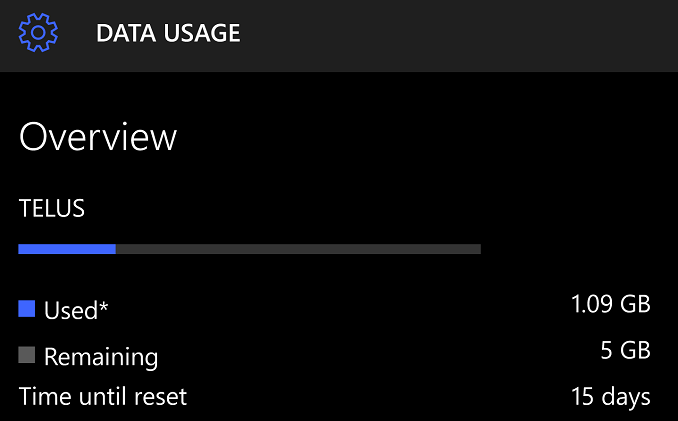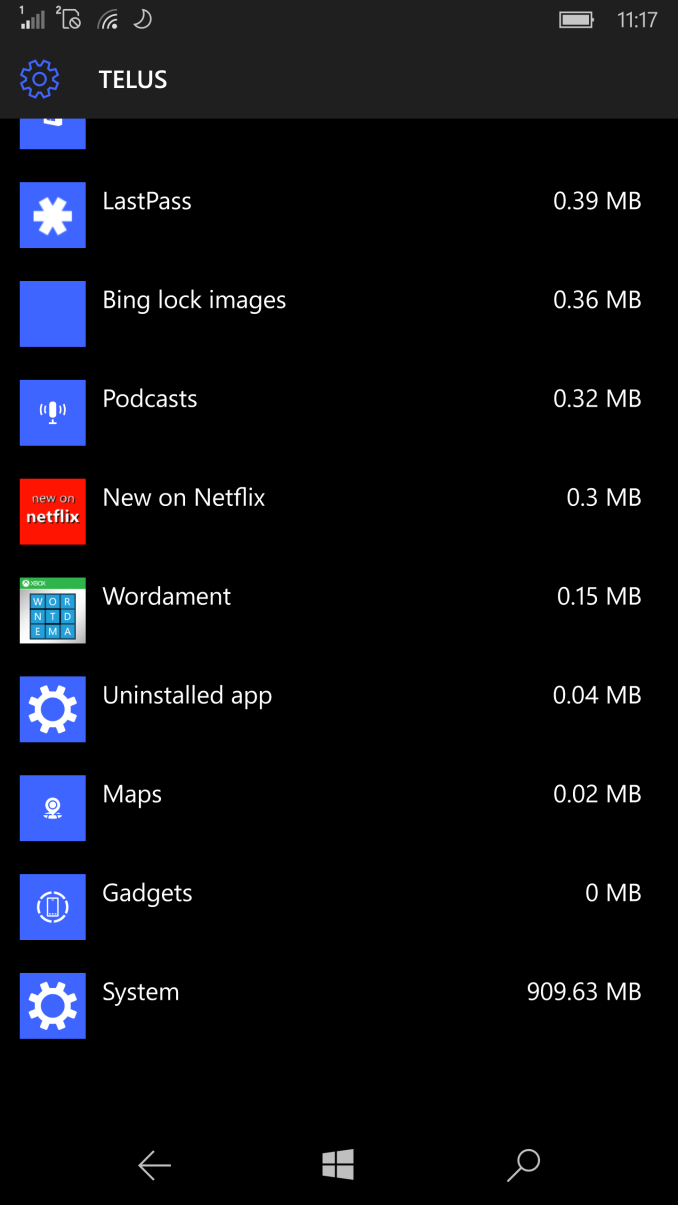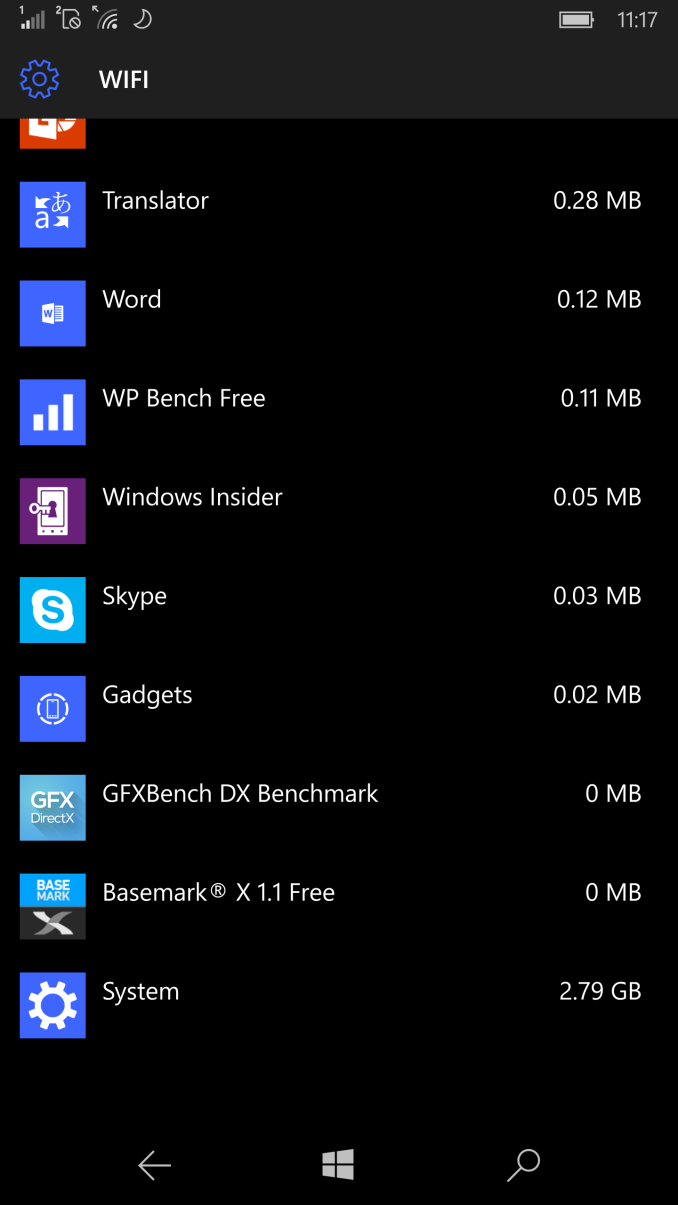Windows 10 Mobile Has A Cellular Data Eating Bug
by Brett Howse on January 27, 2016 7:00 PM EST- Posted in
- Smartphones
- Microsoft
- Lumia
- Windows 10 Mobile

Although Windows 10 has gotten off to a great start by pretty much any metric, Microsoft’s mobile version of Windows 10 has had a pretty bumpy road. Originally thought to be an update for current phones sometime late last year, Windows 10 Mobile is still not available unless you purchase a new Lumia 950, 950 XL, or the budget Lumia 550, all of which were announced in October in New York City along with the Surface Pro 4 and Surface Book.
That does not preclude people from using the new mobile operating system on their existing handsets, because Microsoft offers people in the Windows Insider program access to the pre-release software. Windows 10 Mobile is available for quite a few Lumia handsets, as well as a couple of others like the HTC One M8 for Windows.
For those either with one of the newer Lumia phones, or if you are running on the pre-release version of Windows 10 Mobile on an existing handset, one nasty bug caught me out this month. Windows 10 Mobile includes Data Sense, which originally came back with Windows Phone 8.1, and this system tool monitors all network traffic and reports back usage over WiFi and Cellular. On my own Lumia 950 XL, I noticed I had used more cellular data in January than I had ever used in a single month before. Data Sense let me know that a process called “System” had used over 900 MB of cellular data in just 17 days. Beautifully vague as all bugs are.
Speaking with some other people that use Windows 10 Mobile, I found that it was not an isolated incident. Other users had been reporting the same issue, and in some cases they had used quite a bit more data than this. The culprit, it seems, is a setting which is on by default that backs up text messages to OneDrive, so that you can get them back if you get a new phone or wipe your current phone. It’s a feature that has been part of Windows Phone for some time, and I’ve always left it enabled. Disabling this setting reduces the cellular data usage back to normal. In the messaging app main window, hit the … in the bottom right corner, choose Settings, and turn off Message Sync. To be clear, backing up the text messages should only use a small amount of data, and really it should do it over WiFi only. This is a feature I will re-enable when the bug is resolved.
System used 909 MB on Cellular and 2.79 GB on WiFI in 17 days
In addition, Windows 10 Mobile offers a new feature which will back up install apps to OneDrive as well, and that can be disabled too since it may also contribute to cellular data usage, even if things like the Store are set to download updates only over WiFi. This setting is found under Backup settings.
I reached out to Microsoft to see if they were aware of this issue. In the current age of mobile data caps, this can and has caught people out, causing them to have to pay overage charges with their cellular providers. A Microsoft spokesperson said:
“We have received some customer feedback regarding unexpected mobile data usage and are looking into this.”
The fix provided here is unofficial, in that it hasn’t come directly from Microsoft PR but rather through a Microsoft employee on Reddit thread found by Paul Thurrott of Thurrott.com, but it has appeared to fix the issue I was having. In the last 24 hours, my System process has only used 0.5 MB of data. If you are running Windows 10 Mobile, I would suggest you check into this to avoid racking up any charges on your bill.












45 Comments
View All Comments
grayson_carr - Wednesday, February 3, 2016 - link
I would argue that is not a new problem. I'm on AT&T and really wanted a Lumia Icon when it came out, but nope. Verizon only. And then I don't even think there was an official 930 for AT&T. If there ever was, it must have been about 9 months after the original Lumia Icon release, and by that time of course no one wants that last year's crap.ImSpartacus - Thursday, January 28, 2016 - link
I'd honestly love android with tight ms integration.I love me some Google services, but I don't discriminate. Ms has some useful stuff as well. So if I can get both deeply integrated into my phone, then I'm a happy camper.
xthetenth - Thursday, January 28, 2016 - link
MS plays pretty nicely with Android. It's a huge difference from how ludicrously anti-competitive Google has been with its services on windows phone/mobile.psyq321 - Monday, February 1, 2016 - link
I would not call MS behavior "playing nice" (neither would I call Google's "not playing nice"), it boils down to simple market situation: Microsoft simply has to, for their own business sake, support Android and iOS platforms since these two platforms represent almost the entire market. It is a matter of simple common business sense.On the other hand, Google has zero business motivation to support Microsoft's phone OS, unless Microsoft pays them to do so.
It is mildly ironic that, in the smartphone market, Microsoft found themselves in a similar position Linux was and still is when it comes to widespread "consumer desktop". Lack of market share does not help with 3rd party application porting and it is a vicious circle.
I know Linux can be a great desktop OS for many people, but at least until recently the lack of the familiar application support was a barrier. In these days, consumers mostly use a web browser so this is not such a big problem it used to be, but the change in usage pattern also changed the preferred hardware, where smartphones became the "main" computing device for many consumers. Ironically for Microsoft, this transformation enabled Google to dominate the market with their Linux-based OS. Microsoft's management clearly lacked a clue here for many years and their ineptitude lost Microsoft an opportunity to power hundreds of millions of devices.
andjohn2000 - Sunday, January 31, 2016 - link
It is not a bug, but defective by design. Microsoft wants to monitor users' privacy so the phone will regularly transmit users' data to Microsoft servers. That's why you get high cellular data with it. Just stay away from Microsoft's products10101010 - Wednesday, January 27, 2016 - link
For all of 2012-2014's anti-Google propaganda and rhetoric, Windows 10 does seem to be the ultimate scroogle-the-customer OS.boozed - Wednesday, January 27, 2016 - link
I can't imagine too many people are surprised eitherbeginner99 - Thursday, January 28, 2016 - link
I think that's why it's good to have a Windows PC and an Android or iPhone. Don't let one of the data krakens get to know everything you do.Communism - Thursday, January 28, 2016 - link
That makes no sense.Any of the companies mentioned will sell your data to anyone that can pay.
Giving your data to multiple of them is not magically going to change that.
BrokenCrayons - Thursday, January 28, 2016 - link
I think the point in doing that is to give each company an individually incomplete view of the totality of your computing activity so that those companies have less data to correlate and are less effectively able to mine it to build a profile about you. For instance, say I have an Android phone and a Windows laptop. Google and 3rd party app developers will get access to my phone calls, text messages, how much I use each Android app, and the location of the phone. However, Google won't know about the blogs I read and the purchases I make from Amazon as long as I make it a point to do that sort of thing on my Windows computer and don't use a Chrome browser. If I were to swap out my Windows laptop with a Chrome OS device, Google would easily be able to gather that additional data and associate it with the profile they maintain. The argument is that you're going to leave bread crumbs around the Internet no matter where you go and what you do so you may as well spread those crumbs about to a wider variety of companies in order to make it more difficult for any single company to reassemble the entire loaf.